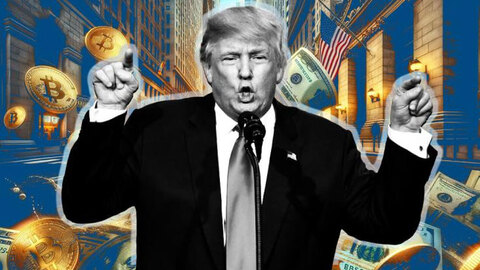
Bitcoin Surges Past $81,000 Amid "Trump Trade" and Growing Crypto Optimism
Bitcoin rose 6.7% over the weekend, with Ethereum up 8% and Cardano surging over 30%, on hopes of stronger Trump administration crypto support. Fueled by the "Trump Trade", Bitcoin has gained 35% post-Trump's win and 94% this year.

Market Frenzy
Within hours of Trump's statements, record-breaking trading volumes were reported by crypto exchanges like Binance and Coinbase. Other altcoins, such as Ethereum and Solana, also saw significant price increases, driving a significant expansion in overall market value in the total cryptocurrency market capitalization.
Trump's pro - cryptocurrency remarks, which included promises to reduce regulatory barriers and promote blockchain innovation, have been key drivers of this market surge. Analysts believe that his support for cryptocurrencies could help accelerate the adoption of decentralized finance (DeFi) platforms. As key components of the DeFi ecosystem, Solana and Ethereum are expected to benefit from potential policy changes favorable to innovation.
Institutional Interest Soars
Trump's backing of cryptocurrencies has further spurred institutional interest in Bitcoin. Notable figures such as new SEC Chairman Paul Atkins and crypto advocate David Sacks have indicated that the U.S. is preparing to push forward with cryptocurrency development, including regulatory easing, approval of more crypto products like ETFs, and the establishment of a clearer legal framework.
Major financial institutions like JPMorgan and Goldman Sachs have announced plans to expand their cryptocurrency product offerings, aiming to take advantage of the growing market interest. Meanwhile, Tesla CEO Elon Musk has also praised Trump's stance on cryptocurrency, stating on Twitter, "Bitcoin has finally received the recognition it deserves"!
Wider Adoption and CBDC Exploration
This surge in Bitcoin's price comes as the U.S. government explores the development of Central Bank Digital Currencies (CBDCs) as part of a broader strategy to maintain competitiveness in the digital finance sector. Several states, including Texas and Wyoming, have already implemented policies that support cryptocurrency, creating a more favorable environment for innovation.
Trump's support for Bitcoin also aligns with his broader push for the U.S. to take the lead in technological advancements, stressing that the U.S. must remain at the forefront of blockchain innovation to stay competitive globally, especially with countries like China making strides with their own digital currencies.
Challenges and Risks
Despite the market enthusiasm, some analysts warn against excessive optimism. Regulatory uncertainty continues to be a major obstacle to the growth of the U.S. cryptocurrency market. The SEC has yet to finalize its stance on crypto assets, and ongoing legal battles involving major exchanges like Binance highlight the vulnerabilities of the industry.
Critics also question whether Bitcoin's rapid price increases are sustainable. Some believe that such fast rises could lead to significant volatility and that a market correction may be imminent.
You May Like
Blockchain: The Backbone of Next-Generation Digital Infrastructure
Blockchain technology has transitioned from a niche innovation to a transformative digital infrastructure underpinning various industries. At its core, blockchain is a decentralized, distributed ledger that records transactions immutably, reducing dependence on centralized entities.
Blockchain Technology in Healthcare Data Management: Enhancing Security, Interoperability and Patient Empowerment
The healthcare industry is undergoing a digital transformation, this data explosion has exposed critical challenges in security, interoperability, and patient control. Blockchain technology has emerged as a promising solution to these challenges.
Blockchain for Digital Identity Verification: A Paradigm Shift in Digital Trust
Blockchain technology, with its core tenets of decentralization, immutability, and cryptographic security, is emerging as a transformative solution for digital identity verification, promising to redefine the relationship between individuals and their digital identities.
Global Bitcoin Adoption and Holdings: A Country-by-Country Overview
Bitcoin, the leading cryptocurrency, has gained strong global foothold, with millions embracing it for diverse uses. Its adoption varies by country, influenced by population, tech infrastructure, and economy, reshaping global finance.